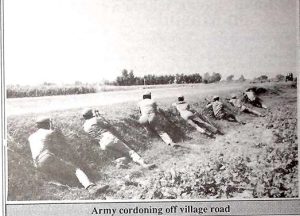
NEW DELHI: While Chief Minister Beant Singh has argued for ‘Army’s increased role in Punjab in cooperation with the police and paramilitary forces, the Army brass is both against any further stay and its new role since the installation of popular government in the state, The new role for the Army is to combat militants in urban area, as the pre-election assigned task of checking border infiltration and militancy in the rural belt and border districts of ‘Amritsar, Gurdaspur, Faridkot and Ferozepur is well under control ‘The Amy’s aversion is because ‘commanders are finding it increasingly difficult to explain the new mission less task to their woops in terms of enemy, rules of engagement and results obtained. “This has already resulted in more than routine indiscipline cases like ‘over-staying leave, desertions and feigning ailment by troops. Such ‘manifest instance coupled with systematic marginalization of ‘commanders by both politicians and bureaucracy may have a detriment cascading effect on the ‘Army in the long run, according to discerning commanders.
In both Rakshak-I and I there ‘was a military job, which no longer exists. These operations were launched to facilitate elections in the state. OF the nearly 120,000 troops deployed during Rakshak in November 1991, bulk were under 11 corps, headquarters in Jalandhar, tasked to check border infiltration and contain militancy in the rural belt and border districts ‘of Amritsar Gurdaspur, Ferozepur ‘and Faridkot. Only portion of 10 comps at Bhatinda and 1 corps (moved in from outside Punjab) at Patiala were to assist the police ‘and paramilitary forces in reformaining terrorism obtained in remaining districts of the state.
Combating militancy is a military job, whereas surgency is a military job, nowhere in the world has regular Army been employed to fight terrorism. Militancy implies creating freedoms usually in border rural areas where lite administration exists. Militants kill discriminately to create personal strongholds through fear of reprisal and are not faceless like the terrorists, Therefore, the Army by combating militancy alleviated the seated fear psychos is and assisted n the re-establishment of the defunct administration
On the other hand, terrorism involves, indiscriminate killings directed against the state might self. The probable targets are hapless innocents in congested urban areas. These faceless state enemies who plant bombs or simply unleash sophisticated weapons and disappear cannot be tackled by the Army, which requires identifiable enemy To combat terrorism special forces are require that can work in close coordination with domestic forces and intelligence agencies
With militancy now under check and since the installation of the popular government, Army has been redeployed largely to comb sat terrorism along with nearly 100,000 police, paramilitary and home guards in the state. For instance, 11 corps in addition to checking border infiltration is now fanned into Sungrur, Ludhiana, Hoshiarpur and Roop nagar districts, 11 corps has replaced corps with the overall Army strength in Punjab being almost same since pre-election time.
This no-win war against terrorism has put Army in a precarious bind on at least four counts. First, there have been numerous instances when even on hard actionable intelligence, Army has missed opportunities to take-on hard-core elements as it waits for the mandatory paraphernalia of women constable, police representative and even magistrate to Join the cordon and search operation,
Second, there is the problem of identification of the terrorist itself, which can be highly counter. Productive. Although Army has ‘operated till now with most restrain, excess, during emotive ‘moments of having own casualties by provocative firing cannot be ruled out. This would refresh ugh memories of operation “Wood rose” conducted in the ‘wake of “Bluestar” in 1984. This would be doubly disastrous for the county, given the fact that vital strategic ground in any future war with Pakistan and has to be defended at all costs. “Third, soldiers are ill-trained 10 indefinitely fight an elusive enemy. Since the infamous IPKF ‘operations, where Army faced the dilemma of enemy identification, has been five years of constant war against a faceless enemy. Nearly all infantry battalions have been through Assam, Kashmir, north-east and Punjab low-intensity warzones.” While Army does ‘not mind fighting at Siachen and along the line of control it’s under enormous pressure against terrorism,” observed a senior commander.
“And most importantly, prolonged employments in aid to civil power have unwittingly thrown troops into parochial politics. For instance, the less known fact about the recent state elections is that in rural areas the Army ran the entire show from preparing candidate’s election canvasing schedules to providing protection to polling officers and even reassuring police and paramilitary forces. While this role for the Army is undesirable, in the long run it is bound to ‘even demystify its awe amongst the terrorists.
The immediate fall-out of these prolonged deployments is that the Army’s tum-over schedules between peace and field areas have blurred to the point of there being no peace areas left. Even total of less than one year stay that jawan ‘got with his family during his entire 15 years’ service has been reduced.
The morale of troops has been further affected by publicly running, down of their commanders. It was an understanding between the Army and central leadership, that after the installation of popular government in Punjab. Army’s phased withdrawal would’ commence. This is what troops were told by their commanders. And this is what Lt Gen BKN Chibber, GOC M1 corps, recently told the press, when he was instantly run down both by the chief minister’ and his police supremo.
While it is improbable that the general spoke on his own, Beant Singh’s retort that Amy would slay as long as required is meaningless as only the central government can order Army’s movements. Besides, the chief minister punctured his own claim of improved law and order situation in the state.
Article extracted from this publication >> July 24, 1992